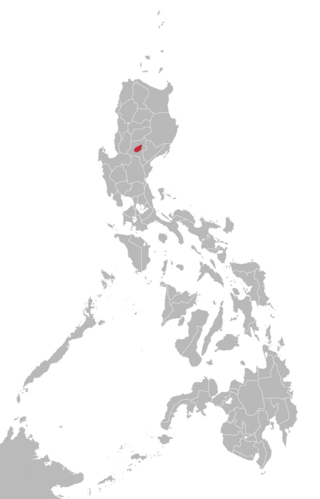Isinai (also spelled Isinay) is a Northern Luzon language primarily spoken in Nueva Vizcaya province in the northern Philippines. By linguistic classification, it is more divergent from other Central Cordilleran languages, such as Kalinga, Itneg or Ifugao and Kankanaey.
| Isinai | |
|---|---|
| Isinay | |
| Native to | Philippines |
| Region | Luzon |
Native speakers | 5,000 (2010 census)[1] |
Austronesian
| |
| Language codes | |
| ISO 639-3 | inn |
| Glottolog | isin1239 |
| ELP | Isinay |
 Area where Isinai is spoken[1] | |
According to the Ethnologue, Isinai is spoken in Bambang, Dupax del Sur, and Aritao municipalities, alongside Ilocano.
Dialects
editEthnologue reports Dupax del Sur, Aritao and Bambang as dialects of Isinai. However, Ethnologue also reports that the Aritao dialect is moribund.[1]
Phonology
edit| Front | Back | |
|---|---|---|
| High | i | |
| Mid | e | o |
| Close | a | |
| Labial | Alveolar | Palatal | Velar | Glottal | ||
|---|---|---|---|---|---|---|
| Nasal | m | n | ɲ | ŋ | ||
| Plosive/ Affricate |
voiceless | p | t | tʃ | k | ʔ |
| voiced | b | d | dʒ | ɡ | ||
| Fricative | f v | s | ʃ | h | ||
| Approximant | l | j | w | |||
| Tap | ɾ | |||||
Isinai is also one of the Philippine languages which is excluded from [ɾ]-[d] allophone.[citation needed]
Grammar
editIsinai contains a definite article with three different forms that vary depending on the relation of the noun. The forms of the definite article are: ar, ardari, and war.[2]
References
edit- ^ Jump up to: a b c Isinai at Ethnologue (25th ed., 2022)
- ^ Conant, Carlos (1915). "Grammatical Notes on the Isinai Language (Philippines)". Journal of the American Oriental Society. 35: 289–292. doi:10.2307/592653. JSTOR 592653.
- Perlawan, Sarah Eve. 2015. Grammatical Sketch of Isinay Dupax. m.s. University of the Philippines, Diliman.
- Reid, Lawrence A., and Analyn Salvador-Amores (2016). Guide to Isinay Orthography. Baguio: Cordillera Studies Center, University of the Philippines, Baguio.